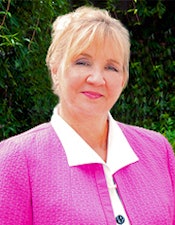
Engaging patients in a meaningful way at the point of care is the single most important thing a dental practice can do to ensure its success. Other minor components may help drive success, but treating patients well while providing the highest quality service is at the heart of a practice's success. This is the golden rule for the modern dental practice in the age of overwhelming competition and a changing patient base.
In previous generations of dental practices, patients simply attempted to "enjoy" the services of a practice even if the service itself was not so enjoyable. Now, patients are more likely to change practices and providers on a whim, noted Lynne Leggett, the founder and CEO of Victory Dental Management.
 Lindy Benton is the CEO and president of Vyne.
Lindy Benton is the CEO and president of Vyne."This can happen especially if a practice is not run as a fine-tuned machine and equipped with a well-trained team focused on service," Leggett said.
Practices, and their providers, must offer the best experience for the patient -- who should be of utmost concern for every dental practice -- or they will very likely lose their business, or at least their profitability.
"Besides my consulting work, I also coach a girls basketball team," Leggett said. "In basketball as in dental practices, when referring to teams, dental practice leaders must understand who is responsible for what and what their individual responsibilities are."
The practice owner must get each staff member to ask, "If I do this, how does it impact everything down the line?" she said. Everything has to be done a certain way for the best outcomes -- on the court or in the practice.
She continued the basketball coaching analogy.
"When I walk into a practice, I don't know if I'm walking into a team that doesn't know how to dribble or if they have a ball hog," Leggett noted. "Dentistry is about relationships, trust, and creating rapport in the team, but teams also need to be strengthened over time. Winning teams have one thing in common -- building rapport with patients, as patients are the most important part of any practice."
Highest priority
While this does not come naturally to many dentists, patient engagement and service should be each practice's highest priority, with the goal of providing patients the best experience possible. Dentist practice leaders must create an environment for a responsive, competitive, and agile practice and work to create practices that create teams, as well as a profitable business. They also should sternly defend the patient experience.
“Practices, and their providers, must offer the best experience for the patient.”
But this is easier said than done, as Leggett noted.
"Serving the patient requires more than smiling as they walk through the door and providing painless fillings," she said. "It's vitally important to realize that labeling your practice employees a team simply because they are part of your organization can be harmful to your practice."
The doctor and the entire staff have to come together for the greater good -- serving patients exceptionally, she said.
"I often tell my clients that there is more to a team than people," Leggett said. "The term team is often overused or used inappropriately. There can be no team without first creating proper roles and responsibilities -- and then communicating these to employees."
Each team member and role will likely require separate responsibilities and guidelines for how he or she interacts with other positions. However, taking and communicating this step is just the beginning of creating a true team at your practice.
Creating a team
In dental school, there is a lot of talk about having a team. But no one is ever taught in dental school how to build a team. Ultimately, building a team is a matter of your mission and vision. If you don't know where you are starting, where are you going to end?
The problem is that many practice leaders have trouble making these things tangible and practical for their businesses. Often, they don't fully understand how their staff or their individual employees can impact their profitability.
"Dental practice leaders need to understand the individual roles and responsibilities of each employee and how those roles can positively impact or create disarray within the practice," Leggett said. "A practice leader's ability to navigate this will determine whether its employees can function as a true team later on."
In part two, Benton and Leggett will discuss managing the human resources cycle, revenue and income, and other practical practice management matters.
Lindy Benton is the president and CEO of Vyne.
The comments and observations expressed herein do not necessarily reflect the opinions of DrBicuspid.com, nor should they be construed as an endorsement or admonishment of any particular idea, vendor, or organization.



















